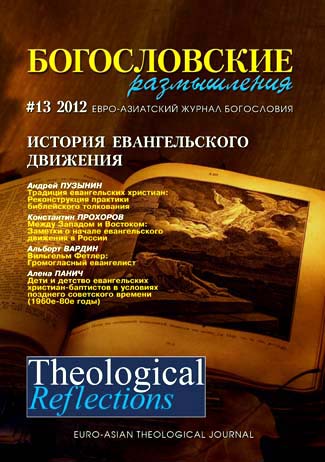Between the West and the East: Notes on the origin of the evangelical movement in Russia
DOI:
https://doi.org/10.29357/issn.2521-179X.2012.13.53Keywords:
Evangelical Movement in Russia, Russian God-seeking, Russian Protestant Choice, State Orthodoxy, Russian Evangelical Baptist, Sectarian currents in Russia, Russian protestant spiritAbstract
The author analyzes the religious situation in the Russian empire in the late nineteenth/early twentieth centuries and depicts the origins of the national «Protestant spirit» and the freedom1loving religious atmosphere of a considerable part of Russian society, morally opposed to any violence on the part of State Orthodoxy but not alien to «true Orthodoxy» in its essence. Precisely this protest and interior freedom at one time gave rise to a wide range of Old Believer and sectarian currents in Russia, quite often surprisingly consonant with each other in their teachings and traditions. Without denying the significance of the «foreign factor» in the formation of the early Russian Evangelical Baptist communities the author also demonstrates their heterogeneity, including both westward1looking and national tendencies. Examples of the direct or mediated adoption of European Protestant ideas are balanced with the well1known self1dependence of the «counter streams» of countless Slavic God1seekers, and the selective attitude of Russian sectarians towards classical Protestant doctrines and foreign worship practices. The author also shows the nature of the Russian Protestant «choice of faith,» which the people of all nationalities in Russia had the opportunity to make.Downloads
How to Cite
Issue
Section
License
Copyright (c) 2020 Constantine PROKHOROV

This work is licensed under a Creative Commons Attribution-NonCommercial 4.0 International License.
All articles published in the Journal are distributed under a Creative Commons Attribution-NonCommercial 4.0 International License
By submitting an article for publication in Theological Reflections: Eastern European Journal of Theology the author grants the editors the right to publish the article and distribute it in electronic and print form.
The author reserves all copyrights and the right to use the materials of the article in whole or in part for educational purposes, to write his own dissertations, to prepare abstracts, conference reports, oral presentations, etc., as well as post electronic copies of articles (including the final electronic version downloaded from the journal’s official website) on non-commercial web-resources without the consent of the editorial board and founders.



